Devonian Period
The Devonian Period is a geologic period that lasted from approximately 419.2 million years ago to 358.9 million years ago. It is often referred to as the "Age of Fishes" due to the diverse and abundant fish species that appeared during this time.
Key Events
- Land Plants: The Devonian saw the rapid diversification of land plants, including the first trees and forests. This had a significant impact on the Earth's atmosphere and ecosystems.
- Evolution of Fish: Fish continued to evolve during this period, with the appearance of jawed fish and the rise of various fish species such as sharks and placoderms.
- Mass Extinction: The end of the Devonian Period was marked by a significant mass extinction event, which had a profound impact on marine life.
Climate and Geography
During the Devonian Period, much of the Earth's landmasses were clustered together in a supercontinent known as Gondwana. The climate was warm and humid, and there were widespread shallow seas in many areas.
Study Guide
Here are some key points to remember about the Devonian Period:
- The Devonian Period lasted from approximately 419.2 million years ago to 358.9 million years ago.
- It is known as the "Age of Fishes" due to the diversification of fish species.
- Land plants rapidly diversified during this time, leading to the formation of the first trees and forests.
- The Devonian saw the evolution of jawed fish and the rise of various fish species.
- The end of the Devonian Period was marked by a mass extinction event.
- Gondwana was the supercontinent during this period, and the climate was warm and humid.
Study these key events and concepts to gain a better understanding of the Devonian Period.
.◂Science Worksheets and Study Guides Third Grade. Weather
Study Guide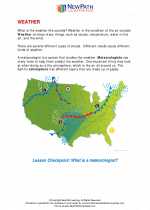 Weather
Weather  Worksheet/Answer key
Worksheet/Answer key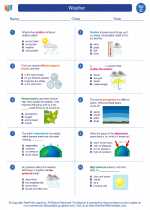 Weather
Weather  Worksheet/Answer key
Worksheet/Answer key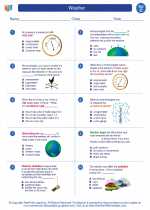 Weather
Weather  Worksheet/Answer key
Worksheet/Answer key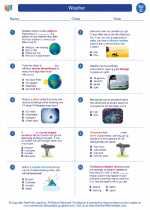 Weather
Weather  Vocabulary/Answer key
Vocabulary/Answer key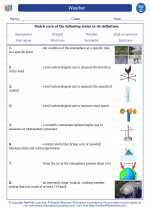 Weather
Weather  Vocabulary/Answer key
Vocabulary/Answer key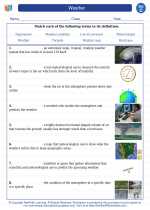 Weather
Weather 

 Worksheet/Answer key
Worksheet/Answer key
 Worksheet/Answer key
Worksheet/Answer key
 Worksheet/Answer key
Worksheet/Answer key
 Vocabulary/Answer key
Vocabulary/Answer key
 Vocabulary/Answer key
Vocabulary/Answer key

The resources above cover the following skills:
EARTH AND SPACE SCIENCE (NGSS)
Earth’s Systems
Students who demonstrate understanding can:
Represent data in tables and graphical displays to describe typical weather conditions expected during a particular season.